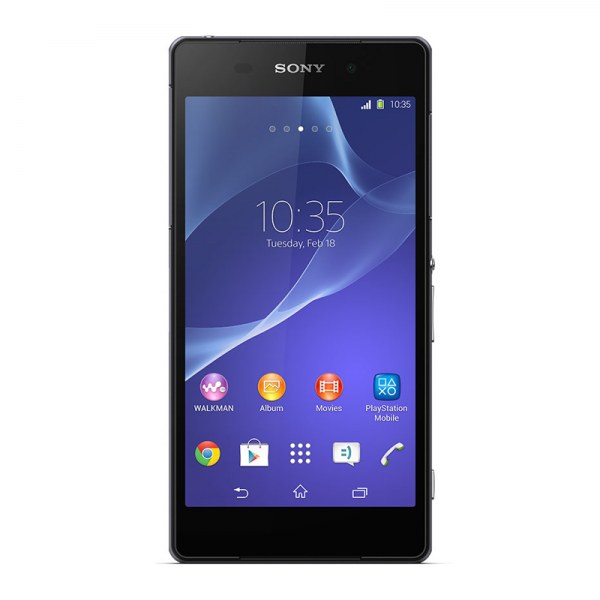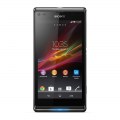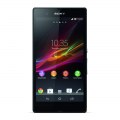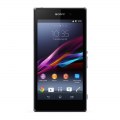Sony Xperia Z2








-
CPU: Quad-core 2.3 GHz Krait 400
-
RAM: 3 GB
-
Storage: 16 GB
-
Display: IPS LCD, 5.2 inches
-
Camera: 20.7 mega pixels
-
OS: Android v4.4.4 (KitKat)
The Xperia Z2 delivers only the best from Sony craftsmanship. Carefully crafted using the most premium materials, it comes with a beautiful one-piece aluminium frame with glass panels that reflect the world around you. The 13.2 cm display, balanced with symmetry in design, provides a natural feel when held in your hand – no matter what angle you hold it.
The Xperia Z2 offers a 13.2 cm display with a stunning high screen to phone size ratio. This gives you a screen size that truly utilises the size of the phone. So when you are looking at something, the phone virtually disappears.
The Xperia Z2 is built with the latest Sony TV display technologies optimised for mobile. It comes with Live Colour LED, a brand new technology integrated only into Sony Mobile displays, for increased colour depth and gradation. And the IPS gives an excellent viewing angle and accurate colours from edge to edge. The large, high-resolution 13.2 cm Full HD TRILUMINOS™ Display for mobile with X-Reality for mobile picture engine has a 1920 x 1080 progressive scan, for incredibly crisp pictures free of jagged edges. Paired with a pixel density of 167 pixels per cm, you get pictures that are razor sharp and incredibly bright.
With IPS technology, the Xperia Z2 offers an improved viewing angle. So you get super sharp images and accurate colours, no matter which angle you’re looking at your device from.
Unique to Sony, TRILUMINOS™ Display technology creates a wider palette of rich, natural colours. With our BRAVIA® TV expertise, hard-to-reproduce reds, aqua blues and emerald greens are displayed beautifully, for a more vivid viewing experience and a heightened sense of depth.
TRILUMINOS™ technology uses LEDs, which emit purer reds and greens, creating a brighter and more uniform light that captures the true colours of the source. From lush landscapes, to natural skin tones – Sony delivers a significantly wider colour range. So you can view every moment in astonishingly authentic colour and breathtaking quality.
Live Colour LED is a brand new technology integrated only into Sony devices, giving you the world’s deepest and most intense colours on a smartphone or tablet display. This new innovation combines red and green phosphor with blue LEDs and customised colour filters to produce a brighter and more uniform light. Capturing true colours without the risk of over-saturation.
From still pictures and low-resolution videos to high-resolution movies, Sony’s unique image software engine analyses each image to optimise colours, sharpness and contrast, as well as reduce noise. The super resolution function reproduces missing pixels, for spectacular clarity and astonishing detail – bringing your favourite moments closer to Full HD quality.
The Xperia Z2 combines small 4K# video capture with a large 1.1 cm 20.7 MP Exmor RS™ for mobile image sensor, Sony’s award-winning G Lens and the intelligent BIONZ™ for mobile image-processing engine. This unique combination means the Xperia Z2 has the same quality and performance as a real compact digital camera. The result is images that are delivered with a superior sharpness, clarity and brightness – always.
Sony’s camera technologies combine to bring you detailed bright shots – even in challenging low-light conditions. The Exmor RS™ for mobile image sensor is an evolution of our Sony image sensor technology, with a next-generation BSI light sensor. It reduces picture noise while maintaining high resolution with a bright F2.0 Sony G lens, high sensitivity Exmor RS™ for mobile and BIONZ™ for mobile’s NR, pixel binning and by-pixel super resolution technologies. And with Superior Auto, it all happens automatically – no need to fiddle around with complicated settings.
Are you living life in the fast lane? Just keep moving – with the best camera phone at hand, your pictures will always come out sharp. The bright F2.0 lens and high sensitivity sensor enable you to take photos with a higher shutter speed. The BIONZ™ for mobile-image processing engine has Motion Detection – it chooses a higher shutter speed to capture blur-free images when your subject is moving. The Superior Auto mode does all the hard work for you.
Sony Xperia Z2 - Specs
General
| Device Type | Smart Phone |
| Model | D6502, D6503, D6543 |
| Announced | 01 February, 2014 |
| Released | 01 April, 2014 |
| Status | Available |
Design
| Type Design Type called form factor refers to a mobile phone's size, shape, and style as well as the layout and position of major components of phone. There are three major form factors seen in mobile phones => bar phones, folding phones and sliding phones. | Bar |
| Dimensions | 146.8 x 73.3 x 8.2 mm (5.78 x 2.89 x 0.32 in) |
| Weight | 163 grams (5.75 oz) |
| Protection | IP58 certified - Dust proof and water resistant over 1 meter and 30 minutes |
| Colors | Black, White, Purple |
Network
| 2G Network | GSM 850 / 900 / 1800 / 1900 |
| 3G Network | HSDPA 850 / 900 / 1700 / 1900 / 2100 |
| 4G Network | LTE 800 / 850 / 900 / 1700 / 1800 / 1900 / 2100 / 2600 |
| SIM SIM (Subscriber Identity Module) is a small card that contains mobile network subscriber's account information. This allows the phone using the card to attach to a mobile network. The SIM card is most commonly associated with GSM and UMTS mobile networks. Moving a SIM card from one phone to another allows a subscriber to switch mobile phones without having to contact their mobile network carrier. SIM cards can also be used by a phone to store limited amounts of data, such as phone numbers and text messages. | Micro SIM |
Display
| Display Type Display Technology => A number of display technologies and types used in mobile phones => TFT (Thin Film Transistor), IPS (In-Place Switching), OLED (Organic Light Emitting Diode), AMOLED (Active-Matrix Organic Light-Emitting Diode), Super AMOLED (an even advanced version of AMOLED), Resistive Touchscreen (Resistive touchscreens contain two layer of conductive material with a very small gap between them which acts as a resistance), Capacitive Touchsceen (Capacitive touchscreen technology consists of a layer of glass coated with a transparent conductor) | IPS LCD |
| Size | 5.2 inches |
| Resolution | 1080 x 1920 pixels |
| Display Colors Display Colors is refers to the number of different shades of colors that the screen is capable of displaying => 64K colors, 256K colors and 16 million colors, Obviously 16M is highest available range of colors and better than others. | 16M colors |
| Pixel Density Pixel Density (PPI) is refers to the concentration of pixels on a particular display, measured in pixels per inch (ppi). Pixel density is calculated by dividing the diagonal pixel resolution of a display by its diagonal size, higher pixel density better display quality. | 424 ppi pixel density |
| Touch Screen | Capacitive touchscreen |
| Display Protection Display Protection => Gorilla Glass is a special alkali-aluminosilicate glass shield with exceptional damage resistance that helps protect mobile displays from scratches, drops, and bumps of everyday use, It is always better to go for a smartphone with Gorilla Glass for that added protection and peace of mind. | Shatter proof glass |
| Features | Multitouch up to 10 fingers, Triluminos display, X-Reality Engine |
Media
| Audio Playback | MP3, Wave |
| Video Playback | Yes |
| Video Out | Yes |
| FM Radio | Stereo FM radio with RDS |
| Alert Types | Vibration, ringtones |
| Ring Tones | MP3, WAV |
| Loudspeaker | Yes |
| Handsfree | 3.5mm Headphone Jack |
Camera
| Primary Camera is able to capture photographs and usually videos, The most important characteristics of a camera are the resolution (measured in megapixels), lens focus type (fixed or automatic), higher megapixel cameras are known to capture higher quality photos, but not always a good measurement of the photos quality. | 20.7 mega pixels |
| Image | 5248 х 3936 pixels |
| Video | Yes, 2160p@30fps, 1080p@60fps, 720p@120fps, HDR |
| Camera Features | 1/2.3'' sensor size, geo-tagging, auto focus, touch focus, face detection, image stabilization, HDR, panorama |
| Flash Flash Light => There is commonly two types of flash lights are used in camera mobile phones, LED Flash (LED flash offers lower power consumption with drive circuitry that takes up very little room, LEDs can be strobed faster than any other light source), Xenon Flash (xenon flash produces an extremely intense full-spectrum white light for a very short duration) | LED flash |
| Secondary | Yes, 2.2 MP, 1080p@30fps, dual video call |
Software
| Operating System OS => Every computer system run on a base software called Operating System (OS). Operating System controls all basic operations of the computer (such as smartphone, PDAs, tablet computers and other handheld devices). The Operating System allows the user to install and run third party applications (apps), apps are used to add new functionality to the device. | Android v4.4.4 (KitKat) |
| User Interface UI or user interface of a device is the look and feel of the on-screen menu system. How it works, its color scheme, how it responds to button presses, all of these things are part of the user interface. | Sony UI |
| Java Support Java for Mobile Devices is a set of technologies that let developers deliver applications and services to all types of mobile handsets, ranging from price efficient feature-phones to the latest smartphones. Java is currently running on over 3 billion phones worldwide, and growing. It offers unrivaled potential for the distribution and monetization of mobile applications. | Yes, via Java MIDP emulator |
| Facebook Facebook is a popular free social networking website that allows registered users to create profiles, upload photos and video, send messages and keep in touch with friends, family and colleagues. The site is available in 37 different languages. | |
| Youtube Youtube is a popular free video-sharing website, Youtube is the largest video sharing site in the world, Millions of users around the world have created accounts on the site that allow them to upload videos that anyone can watch. |
Hardware
| Chipset Chipset is a group of integrated circuits designed to perform one or a more dedicated functions, often with real time computing constraints, Popular smartphones are equipped with more advanced embedded chipsets that can do many different tasks depending on their programming. | Qualcomm MSM8974AB Snapdragon 801 |
| CPU CPU (Central Processing Unit) mostly known as processors, CPU processes instructions in order to carry out certain functions that make your device operate properly. Processors are often described as the brain of computers, smartphones and tablets, Smartphones and tablets rely on processors to carry out their every task, Processors are an incredibly important factor in selecting any type of computing device, including your smartphone. | Quad-core 2.3 GHz Krait 400 |
| GPU GPU (Graphics Processing Unit) is a single-chip processor designed to rapidly manipulate and alter memory to accelerate the creation of images in a frame buffer intended for output to a display, This includes things such as lighting effects, object transformations, and 3D motion. | Adreno 330 |
| RAM (Memory) RAM (Random Access Memory) is a type of computer memory that can be accessed randomly, any byte of memory can be accessed without touching the preceding bytes that allows information to be stored and accessed quickly from random locations. RAM is the most common type of memory found in computer systems, smartphones, tablets and other electronic devices. | 3 GB |
| Internal Storage Internal Storage is a data storage space (flash memory) mostly used in smartphones, tablets and other electronic devices where operating system, apps, music, photos, videos, files and other user data Is stored. | 16 GB |
| Card Slot Memory Card Slot is a special slot for inserting a memory card. Memory cards allow you to expand the phone's built-in memory, A memory card (sometimes called a flash memory card or a storage card) is a small storage medium used to store data such as text, pictures, audio, and video, for use on small, portable or remote computing devices such as mobile phones, mp3 players, digital cameras. | Yes, microSD, up to 128 GB |
| Sensors Sensors are electronic components that detects and responds to some type of input from the physical environment. The specific input could be light, heat, motion, moisture, pressure and location, The output is generally a signal that is converted to use in computing systems, a location sensor, such as a GPS receiver is able to detect current location of your electronic device. | Accelerometer, gyro, proximity, compass, barometer |
Connectivity
| Bluetooth Bluetooth is a wireless communications technology for exchanging data between mobile phones, headsets, computers and other network devices over short distances without wires, Bluetooth technology was primarily designed to support simple wireless networking of personal consumer devices. | Yes, v4.0, A2DP |
| Infrared Infrared connectivity is an old wireless technology used to connect two electronic devices. It uses a beam of infrared light to transmit information and so requires direct line of sight and operates only at close range. | |
| Wi-fi Wi-Fi is a popular wireless networking technology using radio waves to provide high-speed network connections that allows devices to communicate without cords or cables, Wi-Fi is increasingly becoming the preferred mode of internet connectivity all over the world. | Wi-Fi 802.11 a/b/g/n/ac, dual-band, Wi-Fi Direct, DLNA |
| Wi-fi Hotspot | |
| USB | Yes, microUSB v2.0 (MHL 3), USB On-the-go, USB Host |
| GPS GPS The Global Positioning System is a satellite-based radio navigation system, GPS permits users to determine their position, velocity and the time 24 hours a day, in all weather, anywhere in the world, In order to locate your position, your device or GPS receiver must have a clear view of the sky. | Yes, with A-GPS, GLONASS |
| NFC NFC (Near field communication) is a set of standards for smartphones and similar devices to establish peer-to-peer radio communications with each other by touching them together or bringing them into proximity, usually no more than a few inches. | |
| HDMI HDMI (High-Definition Multimedia Interface) is a compact audio/video interface for transferring uncompressed video data and compressed or uncompressed digital audio data from a HDMI-compliant source device to a compatible computer monitor, video projector, digital television, or digital audio device. |
Data
| GPRS GPRS (General Packet Radio Service) is a packet oriented mobile data service on the 2G and 3G cellular communication system's global system for mobile communications (GSM), Generally, GPRS is used for the purpose of wireless data transfer, such as sharing pictures and videos or browsing the Internet via a mobile phone connection. | |
| EDGE EDGE (Enhanced Data GSM Environment) is a wireless network technology generally considered the next step in the 2G network offers data transfer rates up to four times faster than ordinary GSM networks, Generally, EDGE is used for the purpose of wireless data transfer, such as sharing pictures and videos or browsing the Internet via a mobile phone connection. | |
| Speed | GPRS Up to 107 kbps, EDGE Up to 296 kbps, HSDPA, 42 Mbps; HSUPA, 5.8 Mbps; LTE, Cat4, 50 Mbps UL, 150 Mbps DL |
| Web Browser Web Browser => a web browser is a software application used to locate, retrieve and display content on the World Wide Web, including Web pages, images, video and other files, The primary function of a web browser is to render HTML, the code used to design or markup webpages. | Yes, HTML5 |
Messaging
| SMS SMS (Short Messaging Service) is a text messaging service component of phone, Web, or mobile communication systems. It uses standardized communications protocols to allow mobile phone devices to exchange short text messages over the networks. | Yes (threaded view) |
| MMS MMS (Multimedia Messaging Service) is a standard way to send messages that include multimedia content (audio clips, video clips and images) to and from mobile phones over wireless networks using the WAP protocol. | |
| Email Email (Electronic Mail) is a system for receiving, sending, and storing electronic messages, Similar to a letter, email is text messages that may contain files, images, or other attachments sent via the internet to a recipient by using applications and software prograps. An email address is required to receive email, and that address is unique to the user. | Yes |
| IM IM (Instant Messaging) is an exchange of text messages through a software application, it enable you to create a kind of private chat room with another individual in order to communicate in real time over the Internet. | Yes |
Battery
| Battery Type Battery Type => Cell phones run on various kinds of batteries depending on the manufacturer, phone size or shape and features. There are basically four types of cell phone batteries => Lithium Polymer, Lithium Ion, Nickel Metal Hydride and Nickel Cadmium. | Li-Ion (Lithium Ion) |
| Capacity Battery Capacity is a measure (typically in Amp-hr) of the charge stored by the battery, and is determined by the mass of active material contained in the battery. The battery capacity represents the maximum amount of energy that can be extracted from the battery under certain conditions. | 3200 mAh |
| Placement | Fixed |
| Standby Standby Time is the total amount of time that you can leave your is fully charged, turned on and ready to send and receive calls or data transmissions before completely discharging the battery. | Up to 690 hrs (2G) / Up to 740 hrs (3G) |
| Talk Time Talk Time is the longest time that a single battery charge will last when you are constantly talking on the phone under perfect conditions, Ambient temperature and highly dependent on the cellular network environment such as the distance to the closest cell network tower. | Up to 15 hrs (2G) / Up to 19 h rs(3G) |
| Music Play | Up to 120 hours |




